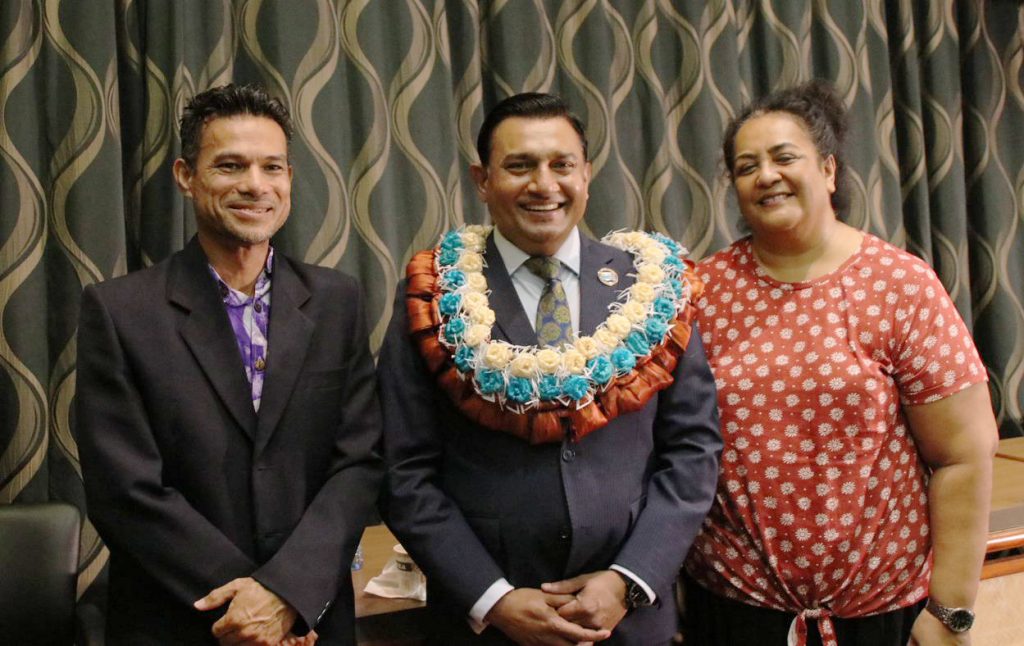

FNU’s College of Humanities and Education Acting Dean Jerry Wong with FICAC Commissioner Rashmi Aslam and Department of Ethics and Governance Acting Head of Department Makereta Mua at the launch.
Fiji National University’s (FNU) College of Humanities and Education launched the Ethics and Anti-Corruption in Oceania (EACO) Course, which aims to empower individuals and organisations to be ethical and assist in eradicating corruption to make Fiji and the Pacific region corruption-free.
The course is a continuation of the very successful Massive Open Online Courses (MOOC) Online Anti-Corruption Module, which was offered in 2021 with the support of Integrity Fiji, Transparency International, and the Fiji Independent Commission Against Corruption (FICAC).
Rashmi Aslam, Commissioner of the Fiji Independent Commission Against Corruption, officially launched the course in the presence of staff, students, and representatives from the Fiji Police Force, Transparency International, and Integrity Fiji.
Aslam stated that combating corruption is a multifaceted and challenging endeavour, requiring the finest competence, meticulous preparation, and rigorous execution. It is the obligation of society as a whole and cannot be accomplished by a single individual or organisation.
“FICAC has been fighting corruption in Fiji for the last 15 years. The key lessons we learned were of multi-dimensional. The corrupt activities have been evolving rapidly with new strategies, and technological advancement has accelerated them to another level. Then came COVID 19, and the fight against corruption has become increasingly difficult.”
“This is the opportune time we gather and unify all our efforts to elevate our unified game plan to fight against corruption. Particularly at this point, the initiative of the Fiji National University is very welcoming.”
“The course is directed towards the individuals working in both public and private sectors and NGOs who have an interest in learning more about ethics, moral reasoning and anti-corruption within the Oceania region. I believe this is an excellent starting point to rejuvenate our values and ethics. We will encourage all Civil Servants to take up this course.”
The Acting Dean of FNU’s College of Humanities and Education Jerry Wong said that FNU views ethics as a vital trait that should be fostered in all students.
“Education and training, such as this course, will lead to changes in people’s attitudes. By adopting a mindset infused with the ideals of integrity, individuals would not simply accept corrupt activities and would freely report them to FICAC,” Wong said.
“With the large amounts of money being made available in Fiji and the Pacific for climate change and sustainable development initiatives, we at FNU believe that the most effective technique for combating corruption is to teach good values to our students and the general public.
“We hope that students will take this idea of integrity and honesty into the workplace and develop a resistance to corruption.”
Acting Head of Department Ethics and Governance Makereta Mua, emphasised that corruption is a global scourge that has permeated all levels of society and all areas of life, including public officials, business managers, and even residents of our country. Corruption exists in all of our nations’ governments and public agencies. It has eroded effective government in Oceania and is harming our people.
“It is timely to introduce this Ethics and Anti-Corruption in Oceania Course for Year 11 to Year 13 students and individuals working in Civil Society Organisations, Non-Government Organisations, and government agencies who are interested in learning more about issues of ethics, moral reasoning, and anti-corruption in the Oceania region,” she said.
“The EACO course is a six-week, 10-credit-point course. It begins on August 8 and concludes on September 16. It consists of five modules covering ethics, values, and integrity, as well as ethical theories. We examine corruption case studies in Oceania as well as the function of anti-corruption agencies and their activity in Oceania.
“This brief course satisfies a critical need to increase understanding and capacity for addressing these concerns. We seek to increase Oceania’s understanding of corruption through fostering personal awareness, critical thinking abilities, and ethical behaviours to resist harmful practices. In addition, we seek to strengthen and reaffirm basic values such as honesty, integrity, and ethical decision-making among course participants.”
Individuals interested in enrolling into this programme can click on this link for more information https://www.fnu.ac.fj/student/academic-services/apply-here/
The application for the course closes on August 5.
FNU aims to be the premier national University providing relevant higher education, technical and vocational education and training, and research and development in Fiji.